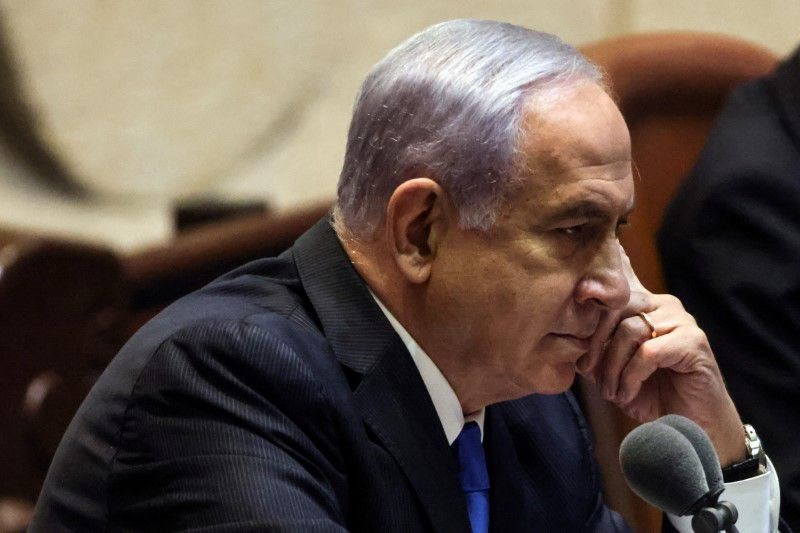Alwaght- In addition to boil-over of the patience of the international community and the opponents of the hawkish Israeli cabinet, the prolongation of war in Gaza has undermined Netanyahu’s position among the allied hardliners, to the extent that he is now feeling the shadow of collapse mor than any other time on his head.
These days and in the midst of differences and conflicts inside the wart cabinet, the unexpected US abstention in the UNSC Gaza ceasefire resolution vote on Monday has pushed Netanyahu even closer to the brink, losing the war, and indeed losing the political battle to his opponents.
In fact, after the recent decision of the UN Security Council to stop the war via a resolution, internal differences and divisions in the Netanyahu government are expected to intensify, because in the situation that the coalition cabinet has not achieved any of the predetermined goals in invasion of Gaza, accepting to retreat and cease the hostilities equals defeat in war with the Palestinian resistance.
Resignation of minister, the first aftershock of resolution
Though in its initial response to the resolution Netanyahu cabinet rejected it and expressed its determination to press ahead with its operation in Gaza to show that the Israeli home unity against the pressures is unwavering, this gesture of resolve has not last long, and amid desperation dominating Tel Aviv hardliners, Gideon Saar, the cabinet minister and head of New Hope party, resigned, showing that aftershocks of the resolution began to hit the Israeli government.
In order to stay in the government, Saar had previously stipulated that he must join the War Council, and so his resignation is in protest of not being allowed into this body. Benny Gantz, the foreign minister, has serious differences with Saar and is against his presence.
"I signed the resignation and I cannot take a post until I have influence and we have not come to the government to warm the seats," Saar said.
Undoubtedly, Saar's resignation has deepened the rift inside the government and worsened the predicament that Benjamin Netanyahu has faced since the beginning of the war.
The New Hope party led by Saar was formed in 2022 with the partnership of Benny Gantz's National Camp Party, and Saar's party manged to win four seats and Gantz's party won eight Knesset seats. After Operation Al-Aqsa Storm on October 7, the bloc joined the National Unity Government led by Netanyahu, but Saar was not allowed in the war cabinet and has therefore repeatedly spoken out against the emergency cabinet's handling of the war.
Saar announced on March 12 that the New Hope was breaking away from the alliance with Gantz, claiming that Gantz and his ally Gadi Eisenkot were blocking a stronger and faster military operation in Gaza. He then asked to be in the war cabinet as the head of an independent and separate party.
Though it is not expected that withdrawal of Saar will lead to collapse of the coalition government that still has 64 out of 120 Knesset seats, it is expected that Saar will step up his anti-government criticism now that he quitted the government.
The far-right ministers, National Security Minister Itamar Ben-Gvir and Finance Minister Bezalel Smotrich, insist on continuing the war to completely destroy Hamas, even if it means not releasing the prisoners safely. This political turmoil will surely increase the rift in the cabinet.
Cabinet gaps grow wider
But crisis in the Israeli cabinet is not limited to this issue and there are various differences over war issues between Netanyahu and other ministers, among them the Defense Minister Yoav Gallant, the political defiance of Foreign Minister Benny Gantz, and the confrontation with radical ministers over exemption of ultra-Orthodox Jews from military service.
The differences between Netanyahu and some of ministers of war cabinet led by Gantz mounted when rumors spread that Netanyahu plans to name Smotrich and Saar as new members of war cabinet, drawing threats of immediate resignation by ministers from Gantz and Eisenkot parties.
Another rift took place with foreign minister when Gantz made an uncoordinated visit to Washington earlier this month, infuriating Netanyahu. This rift even went deeper after Netanyahu canceled a planned visit to Washington of an Israeli delegation in protest to US avoiding to veto a UNSC resolution for ceasefire in Gaza during the holy month of Ramadan on Monday.
Reacting to the cancelation, Gantz said not only the delegation had to go to the US, but also it was good for the PM to visit Washington and talk directly to President Joe Biden and other senior American officials.
Amid these challenges, the two-edged sword of the military service law of Haredi Jews is heavy on Netanyahu. While Netanyahu was forced to accept the privilege of submitting a draft of the Haredi military service exemption law to the Knesset in order to keep the hardline ministers in the cabinet, Gantz threatened to resign and his party will leave if such a law is passed.
These differences have swirled out of control and became a crisis. Even deeper gaps and more resignations are expected in Netanyahu government given the continuation of military failure in Gaza and the failure of prisoner swap deal with Hamas amid growing global pressures on Tel Aviv for its genocide in Gaza.
Aziz Salem, a political expert, told Khaleej Online believes that change in the Western political scene in relation to Gaza war and global condemnation of this regime reflected on the gaps in the Israeli home front.
The difference in the positions of the US and Israeli regime on the tactics and duration of the war is a reflection of the internal divisions of Israel which clearly showed themselves after the resignation of Saar and the widening of the division inside the Netanyahu government, according to Salem.



























